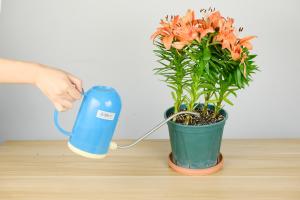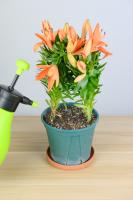Introduction
Plants play a significant role in our ecosystem. They release oxygen, provide food and shelter for animals, and regulate the earth's temperature. However, sometimes, we may notice water droplets on plant leaves, which can make us wonder what it means. In this article, we will explore some possible reasons why plant leaves drip water.
Transpiration
One reason why plant leaves may drip water is due to a process called transpiration. Transpiration is the process by which plants release water vapor through small pores on their leaves called stomata. This process is essential for the plant's growth and survival because it helps to cool the plant and transport essential nutrients and water from the roots to the leaves. High humidity or dew can sometimes cause the water released by transpiration to accumulate on the leaves, resulting in droplets.
Guttation
Guttation is another reason why plant leaves may drip water. Unlike transpiration, guttation occurs when water droplets form at the tips of the leaves or the edges of the flower petals. This process happens when the plant takes in more water than it needs, causing the excess to be released through tiny pores called hydathodes. Hydathodes are located on the tips or the edges of the leaves, and they allow excess water to escape from the plant. Guttation is more likely to occur in plant species that prefer moist soil and high levels of humidity.
Disease or Pest Infestation
In some cases, plant leaves may drip water because of a disease or pest infestation. If a plant is suffering from a fungal or bacterial disease, it may produce excess water or droplets. Similarly, pest infestations, such as spider mites or aphids, can also cause water droplets on the leaves. These pests feed on the plant leaves, causing them to produce excess water in response, which then drips off the leaves. It is vital to identify and treat these diseases or pests as soon as possible to prevent further damage to the plant.
Morning Dew
Another possible reason for plant leaves to drip water is due to morning dew. Morning dew is moisture that accumulates on the plant leaves during the night due to the cooler temperatures, higher humidity, and lack of sunlight. As the temperature rises, the dew on the leaves evaporates, and the water droplets may drip off the leaves. Although morning dew is a natural occurrence, it can also be an indication of favorable environmental conditions for the plant's growth and development.
Conclusion
Plant leaves dripping water can be due to different reasons, such as transpiration, guttation, disease or pest infestation, or morning dew. Understanding these reasons can help us identify potential problems or favorable conditions for plants in our gardens and take the necessary actions to maintain their health and growth.

 how many times do yo...
how many times do yo... how many planted tre...
how many planted tre... how many pine trees ...
how many pine trees ... how many pecan trees...
how many pecan trees... how many plants comp...
how many plants comp... how many plants can ...
how many plants can ... how many plants and ...
how many plants and ... how many pepper plan...
how many pepper plan...






























